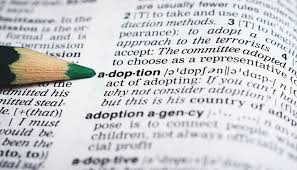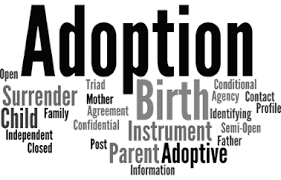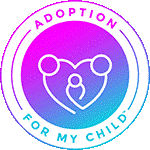Adoption Terms – Vocabulary
Verbiage – Acronyms
Verbiage – Acronyms

A person who joins a family by adoption. Whenever possible, use “person-first” language
A permanent, legally binding arrangement whereby persons other than the biological parent’s parent the child.
An organization that is licensed by a particular state to educate and prepare families to adopt children and to do all the necessary legal, administrative and social work to ensure that adoptions are in the best interests of the children.
The agreement in which the adoptive parent(s) and birth parent(s) put into writing their understanding of the terms of an adoption — including the degree of communication and contact they’ll have with each other and with the adopted child.
Monthly federal or state subsidy payments to help adoptive parents raise children with special needs.
A lawyer who files, processes, and finalizes adoptions in court. In some states attorneys may also arrange adoptive placements.
Compensation to workers through employer-sponsored programs. Some examples of such benefits are financial assistance or monetary reimbursement for the expenses of adopting a child, or provision of “parental” or “family” leave.
An individual who helps would-be adoptive parents decide on an adoption path, and assists in choosing an appropriate agency or attorney.
The interruption of an adoption prior to finalization – sometimes called a “failed adoption” or a “failed placement.”
The interruption or “failure” of an adoption after finalization that requires court action.
An organization which recruits adoptive families for children with special needs using print, radio, television and Internet recruitment, as well as matching parties (which bring together prospective adoptive parents, waiting children and their social workers in a child-focused setting). Adoption exchanges can be local, state, regional, national or international in scope.
An individual whose business involves connecting birth parents and prospective adoptive parents for a fee (allowed in only a few states). In international adoption, a facilitator may help adoptive parents complete an adoption in the child’s country of origin.
Insurance which protects against financial loss which can be incurred after a birth mother changes her mind and decides not to place her child for adoption.
The document issued by the court upon finalization of an adoption, stating that the adoptee is the legal child of the adoptive parents.
The legal document through which prospective parents request the court’s permission to adopt a specific child. Adoption Placement – The point at which a child begins to live with prospective adoptive parents; the period before the adoption is finalized.
The unique, individual plan a particular set of biological parents makes for the adoption of their child.
A person or persons who become the permanent parents with all the social, legal rights and responsibilities incumbent upon any parent.
The point at which a child begins to live with prospective adoptive parents; the period before the adoption is finalized.
A plan created between a birth mother and a social worker specifying all aspects and desires with regards to an adoption.
Employee of a licensed adoption agency or a trained and educated adoption authority who has training and experiences in adoption services and authorized by the agency to provide adoption services.
Reclaiming of a child (originally voluntarily placed with adoptive parents) by birth parent(s) who have had a subsequent change of heart. State laws vary in defining time limits and circumstances under which a child may be reclaimed.
An expression used to describe the three-sided inter-relationships among adopted children, their birth parents, and their adoptive parents.
Physical or cognitive deficits in a child which result from maternal alcohol consumption during pregnancy – includes but is not limited to Fetal Alcohol Syndrome (FAS) and Fetal Alcohol Effect (FAE).
The placement of a child into the prospective adoptive family before the birth parents’ rights have been legally extinguished.
Refers to a child that has heritage of two races, usually African-American and another race.
The child of parents by birth.
A category of mental illnesses in which mood and affect are disturbed – characterized by irregular cycles of mania and/or depression. During manic periods, the individual may be in a very elevated mood and exhibit symptoms of hyperactivity, wakefulness and distractibility or irritability. In very severe episodes, psychotic symptoms may also be present. Individuals experiencing depressive periods can exhibit sustained symptoms of depressed mood, diminished pleasure or interest in most activities, fatigue, sleep disturbance (either insomnia or hypersomnia), weight loss or weight gain and slowed thinking.
When a child is born a certified document indicates the birth information of a person including mother’s and father’s name and the name given to the child at the time of birth. Once the adoption is finalized, the original birth certificate is amended reflecting the adoptive parents as the child’s parents and the original birth certificate is sealed and in many states remains confidential.
The biological father of a child.
The biological grandparents of a child.
are the court-approved moneys provided by adoptive families to birth mothers to help cover their pregnancy-related costs.
The biological mother of a child who made an adoption plan for the child and subsequently relinquished the child for adoption.
The parents who conceived a child, made an adoption plan for the child and subsequently relinquished their parental rights to the child and created an adoption plan. Also referred to as the biological parents.
Adoption performed outside the law, often referred to as the illegal buying and selling of children.
Infants abandoned in hospitals because of the parents’ inability to care for them. These babies are usually born HIV-positive or drug addicted.
A copy of an official document, like a birth certificate, marriage certificate, or divorce decree, that has been certified by an official to be authentic and bears an original seal or embossed design.
An adoption where there is no contact between biological parents and adoptive parents. Sometimes referred to as a closed adoption.
A birth parent’s legal permission for the adoption to proceed.
The legal document signed by the biological mother and father allowing their child to be placed for adoption. If birth parent is unavailable, the courts can validate the consents without the birth parents’ signature. (A consent is also referred to as a surrender or relinquishment).
Adoption in which adopted child has access to both adoptive parents and birth parents who participate in decisions affecting their life.
Acronym for Child Protective Services.
A set of attitudes, behaviors and policies that integrates knowledge about groups of people into practices and standards to enhance the quality of services to all cultural groups being served.
Authority by a person or guardian embodying all of the rights and responsibilities.
A legal order that finalizes an adoption.
An adoption process that is halted after the prospective adoptive parents have taken custody but before legally finalization.
An adoption in which the birth parent(s) choose(s) the adoptive parent(s) for the child.
An adoption in which the parent-child legal relationship is severed after finalization.
An adoption that involves adoptive parents and a child that are permanent residents of the United States.
A collection of required documents that is sent to a foreign country in order to process the adoption of a child in that country’s legal system.

An adoption match that is made after the child has already been born. Also referred to as a “baby-born situation,” “hospital match,” or “stork-drop.”
Adoption benefits provided to employees as part of an employer-sponsored benefit program, which are included within their employment compensation package.
A woman who is pregnant and considering adoption for her child after she gives birth.
An individual that is not licensed as an adoption agency or licensed as an attorney, and who is engaged in the matching of biological parents with adoptive parents.
The court hearing that results in the adoption order. This is the moment when the adoptee becomes the permanent, legally adopted child of the adoptive parents.
State- or county-licensed adults who provide a temporary home for children whose birth parents are unable to care for them.
A multinational agreement designed to promote the uniformity and efficiency of international adoptions.
Children whom agencies consider difficult to place because of emotional or physical disorders, age, race, membership in a sibling group, history of abuse, or other factors.
A three-part process required before a child can be placed with a family for foster care or adoption: (1) Written portion includes autobiographies, references, medical reports, financial statements, child abuse and criminal clearances and other written materials; (2) Social work process includes a series of visits in the applicants’ home to discuss a variety of issues from the applicants’ backgrounds to their motivations to adopt and their understanding of adoption and parenting; (3) Educational process includes training in adoption and parenting issues. The end result of this process is a written document completed by a licensed agency giving a summary of the applicants’ family life. This document indicates approval of the applicants for adoption. In most states it must be updated annually.
An adoption arranged privately between the birth family and the adoptive family, without an adoption agency.
The adoption of a child from a country outside of the United States.
If a child is born in a state other than where the prospective adoptive parents reside, the Interstate Compact of both the baby’s home state and the prospective adoptive parents’ home state must give their approval before the child travels (for the purpose of adoption) to the state where the prospective adoptive parents reside. In an interstate adoption, the agency with custody of the child is responsible for processing the interstate paperwork.
Adoption by a biological relative of the child.

A person who has legal responsibility for the care and management of a person (such as a minor child) who is incapable of administering his or her own affairs.
Placement of a child in a prospective adoptive family when the child is not yet legally free for adoption.
The process of bringing together qualified prospective adoptive parents and willing biological parents, who by choice choose to explore the compatibility of each other and who can agree on the terms under which the adoptive parents can adopt the child.
Residences for pregnant women. The number of homes has decreased over the past three decades, and existing homes often have a waiting list of women. The women who live in a maternity home may pay a small fee or no fee to live in the home and they often apply for public assistance and Medicaid payments.
Acronym for Multi-Ethnic Placement Act of 1994.
Children of partial or full non-Caucasian parentage, or mixed Caucasian and non-Caucasian heritage.
A federal law enacted in 1994 and implemented through state policy. The Multi-Ethnic Placement Act of 1994, as amended, P.L. 103-382 [42 USC 622] prohibits the delay or denial of any adoption or placement in foster care due to the race, color or national origin of the child or of the foster or adoptive parents and requires states to provide for diligent recruitment of potential foster and adoptive families who reflect the ethnic and racial diversity of children for whom homes are needed. The 1996 amendment, Section 1808 of P.L. 104-188, Removal of Barriers to Interethnic Adoption, affirms the prohibition against delaying or denying the placement of a child for adoption or foster care on the basis of race, color or national origin of the foster or adoptive parents or of the child involved [42 USC 1996b].
Refers to a child that has heritage of two or more races.
Information that allows the birth and adoptive families to learn pertinent facts about each other without revealing who they are or how they can be contacted.
Onetime adoption expenses, which may be at least partially reimbursed by states up to a maximum amount to families adopting children with special needs. Allowable expenses for this reimbursement benefit can include the cost of a home study, adoption fees, court costs, attorney fees, physical and psychological examinations, travel to visit with the child prior to the placement and other expenses related to the legal adoption of a child with special needs.
Any agency that does not have any religious requirements for its clients.
An open adoption involves the disclosure of identifying information between the biological parents and the adoptive parents. Both the adoptive parents and biological parents agree upon the amount of contact following the placement of the child.
Child from another country that has no parents or only one parent that cannot care for them.
Photos and descriptions of children who are available for adoption
A term used to describe the point in time when the child comes to live with the adoptive parents in their home.
A variety of services provided after the adoption is finalized, including counseling, social services, and adoptive family events, and outings.
Private adoption refers to an adoption in which the adoptive parents adopts a child they already know or adopt through an individual birth mother, and do not have to go through an adoption agency to acquire an adoptive child.
Nongovernmental adoption agencies licensed by the state.
Social service agencies run by state or county governments that deal mainly with children in foster care.
a.k.a. Birth Father Registry, state registry where alleged paternity can be listed, and birth fathers have the opportunity to protest the birth mother’s adoption plans. Approximately one-half of the states have a putative registry.

For a child adopted in another country, a second adoption in a U.S. court.
The document that identifies a child available for international adoption.
Voluntary termination of parental rights. Some prefer the phrase “making an adoption plan.”
A structured 24-hour care facility with staff that provide psychological services to help severely troubled children overcome behavioral, emotional, mental or psychological problems that adversely affect family interaction, school achievement and peer relationships.
Therapeutic intervention processes for individuals who cannot or do not function satisfactorily in their own homes. For children and adolescents, residential treatment tends to be the last resort when a child is in danger of hurting himself or others.
A meeting between an adopted person and birth parents or other birth relatives.
When a biological parent revokes the consent they had signed to an adoption and requests that the child be returned to his/her custody.
An attempt to locate and/or make a connection with a birth parent or a biological child.
A semi-open adoption occurs when the potential biological mother or biological families experience non-identifying interaction with the adoptive family. In most cases, the interaction is facilitated by a third party who is usually an adoption agency or adoption attorney.
The use of marketing principles and techniques to influence a target audience to voluntarily accept, reject, modify or abandon a behavior for the benefit of individuals, groups or society as a whole.
Person who completes home studies, works with birth parents and adoptive families in adoption situations.
A child with medical, mental, emotional, behavioral, or educational needs that could require extra on-going attention.
The legal document signed by the biological parents in which they place their child with an adoption agency who in turn places the child with the adoptive family that the biological parents choose. In some states this may be referred to as “relinquishment” or “consent.”
A tax credit for qualifying expenses paid to adopt an eligible child. The adoption credit is an amount subtracted from the adoptive parents’ tax liability.
The process by which a parent’s rights to his or her child are legally and permanently terminated, after which the child becomes eligible for adoption.
An adoption in which the child and the adoptive parent(s) are not of the same race.
Most often used to refer to a domestic infant adoption in which confidentiality is preserved. Equivalent to a Closed adoption.
An agency of the federal government that approves an adopted child’s immigration into the United States and grants
A reunion registry system which allows adoptees, birthparents and biological siblings to locate each other if they wish by maintaining a voluntary list of adoptees and birth relatives.
A child currently available for adoption. Waiting children may be in the U.S. foster care system, might be older, or could be special needs children.
Typically refers to the time period which must lapse between birth and the time the consent to the adoption can be signed by the birth parents (varies from state to state).

AAAA
American Academy of Adoption Attorneys
AAC
American Adoption Congress
AACAP
American Academy of Child and Adolescent Psychiatry
AACWA
Adoption Assistance and Child Welfare Act
AAOAA
American Association of Open Adoption Agencies
AAP
American Academy of Pediatrics
AASK
Adopt a Special Kid
ACAL
Association of California Adoption Lawyers
ACR
Administrative Case Review/Revision Administrative de Cases
ACYF
Administration for Children, Youth, and Families
ADA
Americans with Disabilities Act
ADD
Attention Deficit Disorder
ADHD
Attention Deficit Hyperactivity Disorder
AFA
Adoptive Families of America
AFCARS
Adoption and Foster Care Analysis and Reporting System
AFDC
Aid to Families with Dependent Children
AFDC-FC
Aid to Families with Dependent Children in Foster Care
AMA
American Medical Association
APC
Adoptive Parents Committee
APHA
American Public Health Association
APSAC
American Professional Society on the Abuse of Children
APT
Agency Placement Team
ASFA
Adoption and Safe Families Act
ASPA
American Psychoanalytical Association
BCIS
Bureau of Citizenship and Immigration Services
BCPs
Birth Control Pills
BD
Behaviorally Disturbed
BF
Boyfriend
BM
Birth Mom, Breast Milk or Bowel Movement (depending on context)
BMOM
Birth mom
BN
Birth Name, Bastard Nation
BOCYF
Board on Children, Youth, and Families
CARE
Coalition for Adoption Registry Ethics
CASA
Court Appointed Special Advocate
CASSP
Child and Adolescent Services System Program
CAU
Case Assignment Unit
CAVITH
Communities Against Violence in the Home
CCAA
China Center for Adoption Affairs
CCAI
Chinese Children Adoption International
CCBYS
Comprehensive Community-Based Youth Services
CDC
Centers for Disease Control and Prevention
CD-CP
Child Development – Community Policing Program
CERA
Council for Equal Rights in Adoption
CERAP
Child Endangerment and Risk Assessment
CEVI
Children’s Exposure to Violence Initiative (U.S. Dept. of Justice)
CF
Cervical Fluid
CFPC
Child and Family Policy Center
CFS
Children and Family Services
CM
Cervical Mucus
CMHC
Center for Medical Health Center
CMHS
Center for Medical Health Services
CPC
Crisis Pregnancy Center
CPI
Child Protection Investigator
CPS
Child Protective Services
CSAP
Center for Substance Abuse Prevention
CSN
Children’s Safety Network
CSP
Client Service Plan
CSW
Children’s Social Worker
CWF
Center for Women and Families
CWI
Child Welfare Institute
CWIG
Child Welfare Information Gateway
CWS
Child Welfare Systems
CWSI
Child Welfare Services Initiative
DCFS
Department of Children and Family Services
DCP
Division of Child Protection
DD
Developmentally Disabled
DET
Detention Facility/Jail
DMH-DD
Department of Mental Health and Developmental Disabilities
DOC
Department of Corrections
DOJ
Department of Justice
DTC
Dossier to China
DV/CPS
Domestic Violence/Child Protective Services
DVIRC
Domestic Violence & Incest Resource Center
DYCS
Division of Youth and Community Services
EBD
Emotionally or Behaviorally Disturbed
EDD
Estimated Due Date/Expected Date of Delivery
FAFW
Family Assessment Factor Worksheet
FAIR
Families Adopting in Response
FASD
Fetal Alcohol Spectrum Disorder
FCI
Foster Care Initiative
FDP
Family Development Plan
FDS
Family Development Specialist
FF
Formula Feeding
FFA
Foster Family Agency
FFCMH
Federation of Families for Children’s Mental Health
FHA
Foster Home Adoptive
FHP
Foster Home Boarding-Private Agency
FHS
Foster Home Specialized
FOC
Future of Children
FPA
Foster Parent Association
GAL
Guardian Ad Litem
HHS
Department of Health and Human Services
HIPAA
Health Insurance Portability and Accountability Act of 1996
HMO
Health Maintenance Organization
HMR
Home of Relative
HOT
Heart of Triad
HP
Health Passport
HPT
Home Pregnancy Test
IC
Incompetent Cervix
ICAR
Inter-Country Adoption Registry
ICF
Intermediate Care Facility
IEAP
Inter-Ethnic Adoption Provisions (Small Business Protection Act)
IEP
Individualized Education Plan
IFSP
Individual Family Services Plan
IGH
Institutions and Group Homes
IMD
Institution for Mental Disease
ISC
Independent Search Consultants
L&D
Labor and Delivery
MAPS
Main Adoption Placement Services
MC or M/C
Miscarriage
MCH
Maternal and Child Health Program
MEPA
Multi-Ethnic Placement Act
NAC
National Adoption Center
NACA
National Association of Child Advocates
NACAC
North American Council on Adoptable Children
NCALP
National Center for Adoption Law and Policy
NCCC
National Center for Cultural Competence
NCCEV
National Center for Children Exposed to Violence
NCCIC
National Child Care Information Center
NCCUSL
National Commission for Creation of Uniform State Laws
NCEMCH
National Center for Education in Maternal and Child Health
NCFA
National Council for Adoption
NCFY
National Clearinghouse on Families and Youth
NCJFCJ
National Council of Juvenile and Family Court Judges
NCJJ
National Center for Juvenile Justice
NCMEC
National Center for Missing and Exploited Children
NCPC
National Crime Prevention Council
PAP
Prospective Adoptive Parent
Pg or PG
Pregnant/Pregnancy
PPD
Postpartum Depression
SN
Special Needs
SW
Social Worker
Title V
Maternal and Child Health (Section of the Social Security Act)
Title X
Federal Family Planning Program (Section of the Social Security Act)
Title XIX
Medicaid (Section of the Social Security Act)
Title XVIII
Medicare (Section of the Social Security Act)
TPR
Termination of Parental Rights
TTC
Trying to Conceive
U/S
Ultrasound
UAA
Uniform Adoption Act
US or U/S
Ultrasound
VAWO
Violence Against Women and Family Violence
VBAC
Vaginal Birth After Cesarean Section
WIC
(Special supplemental food program for) Women, Infants, and Children

Copyright © Adoption For My Child | Contact Us
